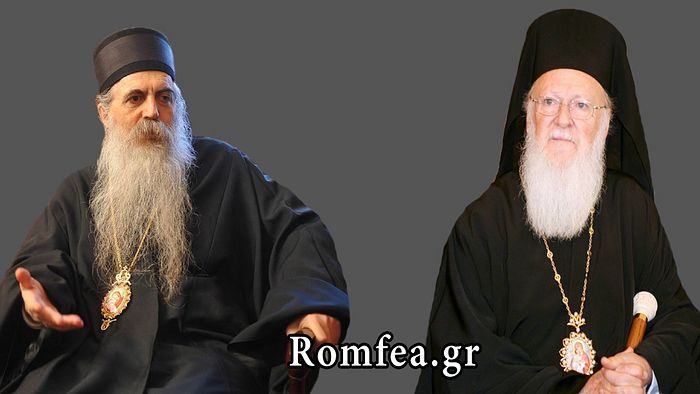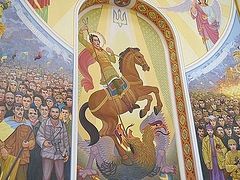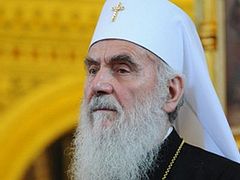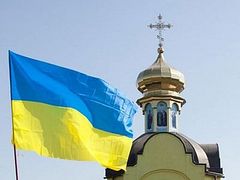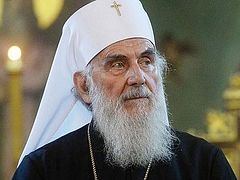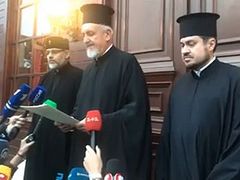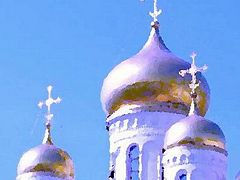Bačka, Serbia, November 6, 2018
Many Serbian faithful and clergy are struggling to understand why Patriarch Bartholomew of Constantinople spends so much time with and pays so much attention to the Ukrainian authorities and schismatics while completely ignoring the hierarchs and views of the canonical Ukrainian Orthodox Church, writes His Grace Bishop Irinej of Bačka in a statement posted on the Serbian Church’s official site.
The canonical Church is twice as numerous as the schismatics and recognized by all Local Orthodox Churches, the Serbian hierarch noted in his statement that came as a response to the recent signing of an agreement on cooperation between the Ecumenical Patriarchate and the Ukrainian state.
Pat. Bartholomew and Ukrainian President Petro Poroshenko signed a statement on Saturday in Constantinople, “reaffirm[ing] their desire to enhance the cooperation between the Ecumenical Patriarchate and the Ukrainian Nation—within the framework of the process for granting Autocephaly to the unified Orthodox Church in Ukraine,” as the Ecumenical Patriarchate reports.
“Until now, not a single Local Orthodox Church officially supports Constantinople’s activities, and there are constant—often quite fierce—discussions about the current crisis that is, undoubtedly, the greatest in the last thousand years,” Bp. Irinej writes.
According to His Grace, many of the faithful and clergy are confused and embarrassed by the fact that the Ecumenical Patriarch, without concealing himself, cooperates and communicates only with the secular authorities and politicians, dominated by supporters of the schismatics and Uniates, but refuses to cooperate with the representatives of its sister Orthodox Church.
The Ukrainian Church itself has noted the same thing. In a recent interview with orthodoxia.info, His Eminence Archbishop Clement of Nizhyn and Prilutsk, the head of the Ukrainian Church’s Information Department, notes that Pat. Bartholomew “communicates with the President and wiith the head of Parliament, who isn’t Orthodox. He communicates with the schismatics. But from this Patriarch, not a word of support has been heard for the many-million strong flock of the canonical Church.”
Moreover, many theologians are critical of Constantinople’s decision to abolish the ecclesiastical sanctions of the Russian Orthodox Church against Philaret Denisenko and the other Ukrainian schismatics. Bp. Irinej notes that Constantinople previously recognized the correctness of these decisions. Until now, all Local Orthodox Churches continue to recognize these decisions, he writes.
In 1992, following Philaret Denisenko’s defrocking, and in 1997, following his anathematization, Pat. Bartholomew wrote to the Russian Church acknowledging both their “exclusive competence” to rule on the matter and the content of their decision. The Patriarchate has not yet clarified when and how this “exclusive competence” moved from the Moscow to the Ecumenical Patriarchate.
“It’s particularly interesting—how is it possible that in the blink of an eye anathematized schismatics became the ‘Metropolitan of Kiev,’ and in a broader title the ‘Patriarch of Kiev’?” Bp. Irinej asks.
“Finally, there arises the question of how it’s possible to simply ‘put out of power’ the Church status of another Local Church that is more than 300 years old. Moreover, no one, not even the Patriarchate of Constantinople itself, has ever disputed it before,” said the Serbian hierarch, adding that “unfortunately, there are still many such issues.”
Archbishop Job (Getcha), a hierarch of Constantinople, recently explained that Constantinople’s decisions on October 11 abolished the Ukrainian Orthodox Church and made all bishops in Ukraine, whether canonical or schismatic, into bishops of Constantinople.
“We must pray to God and hope that everyone will understand that primacy in the Church belongs only to the Lord Jesus Christ and the unity of the Church is incomparably more important than all possible ambitions and aspirations,” Bp. Irinej concluded.
Bp. Irinej also previously wrote against Constantinople’s intrusion into the canonical territory of the Ukrainian Orthodox Church and its claims to the rights to resolving all issues by its own initiative.
Follow us on Facebook!

